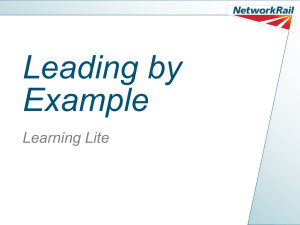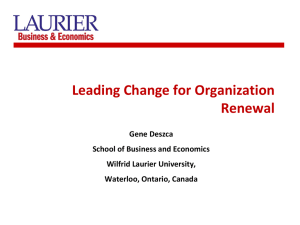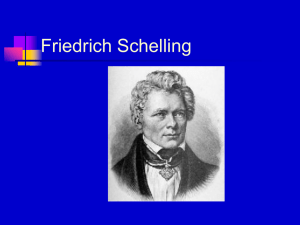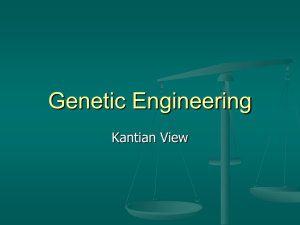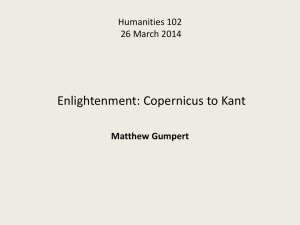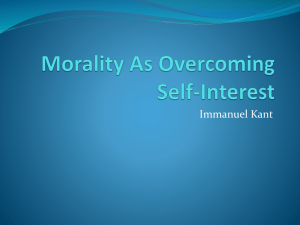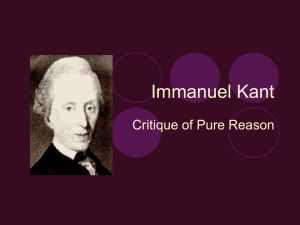Immanuel Kant - Self Mastery
advertisement
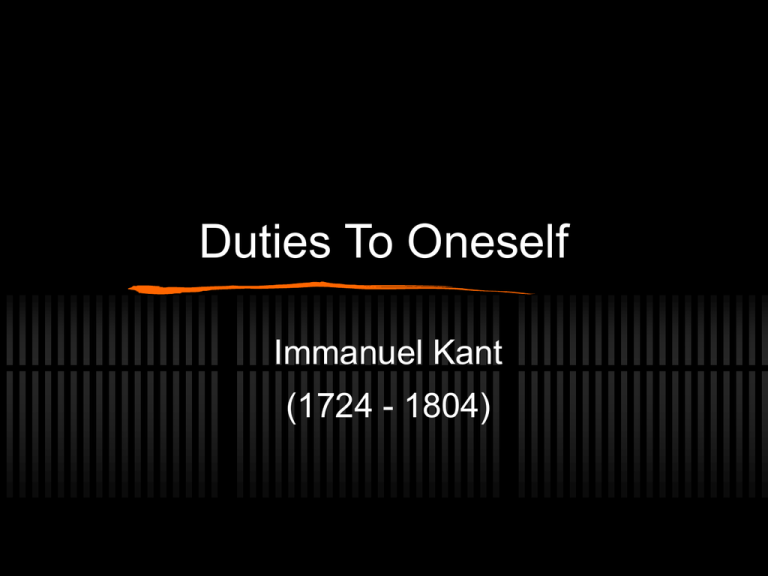
Duties To Oneself Immanuel Kant (1724 - 1804) Biographical Info Born in Konigsberg, Prussia - now Kalingrad, Russia, near Sweden. Kant lectured at the University of Konisgsberg in mathemathics, logic, geography, history, & philosophy. One can literally follow in his footsteps today on “Philosopher’s Walk,” the path he traveled daily in contemplation and exercise. Individual Morality Kant was eager to describe ethics as not only our duty to others, but primarily to ourselves as well. Since we are free beings, we have to self-limit in order to protect ourselves from ourselves - in the process we protect others as well. Individual Morality, continued We should act in a way that allows us the fullest freedom/control at all times. In Kant’s system, any act which incapacitates our ability to do so is wrong: this includes drinking or eating in excess, anger, theft, etc. Proper Self Respect It is both our right and our responsibility to consider ourselves equals to everyone else: neither better nor worse, but equal - this limits transgressions against and by the Self. If we feel we are lacking, it should always be in terms of failing to protect ourselves from ourselves, never in comparing ourselves to others. Self Mastery We accomplish this choice to remain balanced with the world, what Kant calls Self Mastery, through 3 processes: Self-Scrutiny Self-Perfection Self-Observation Self-Scrutiny This involves taking a close look at our priorities, and doing away with those priorities that are selfish. By checking with ourselves on a daily basis to root out selfish motives, we begin to arrive at Self Mastery. Self-Perfection We must also develop a healthy mind and body: the state of our body affects the mind, which influences our thinking, which defines our actions. Striving for perfection of body translates to a perfection of conduct: base, fleeting pleasures should be traded for those which result in long term benefits. Self-Observation This involves taking a close look at our actions on a daily basis, and their cause: good intentions that protect the self, or bad intentions that don’t. Further, good intentions must translate into good actions, or they are worthless. Ills & Wickedness The opposite of ill is well-being: ills are those realities beyond our control which negatively affect us. The opposite of wickedness is good conduct: wickedness is defined by those realities within our control which negatively affect us. Ills & Wickedness, continued For Kant, ills are to be endured in a way that maintains our freedom/control: we do not let misfortune cause us to act in ways which ultimately bring us suffering. Wickedness, on the other hand, must be cause for concern: evil, particularly our own, should disturb us. Necessities & Amenities Kant suggests a focus on what is necessary vs. what is amenable: we must be content with necessities, and never allow amenities to take a position alongside those things we need. In this way, we maintain our dignity and humanity, and limit being affected by ills or acting wickedly, always cognizant of our priorities. Cheerful Courage Ultimately, for Kant, the idea is to adopt an attitude of cheerful courage: we should neither greatly limit our pleasure nor revel in it. From a positive frame of mind, we face adversity, diminish wickedness, and stay true to our Self.



